Discover the mystical beauty of Ta Prohm, Cambodia’s iconic “Jungle Temple,” where massive tree roots entwine with ancient ruins, offering travelers an unforgettable blend of history and nature. Perfect for culture lovers, photographers, and those seeking the Best Places in Cambodia.
TABLE OF CONTENTS
1
Ta Prohm – The Jungle Temple of Angkor
Why Ta Prohm is One of the Most Iconic Temples in Cambodia
A Brief History of Ta Prohm – Built by the Khmer Empire
Ta Prohm’s Role in Popular Culture (Tomb Raider & More)
2
Unique Features of Ta Prohm – Nature Meets Architecture
The Mesmerizing Giant Tree Roots Taking Over the Temple
Mysterious Carvings and Ancient Ruins
The Atmospheric and Photogenic Appeal of Ta Prohm
3
Best Time to Visit Ta Prohm
Ideal Seasons for the Best Experience
Best Time of Day to Avoid Crowds
Weather Considerations & Travel Tips
4
How to Get to Ta Prohm
Location Within the Angkor Archaeological Park
Transportation Options – Tuk-Tuks, Bicycles, and Tours
Entrance Fees and Ticket Information
5
Things to Do at Ta Prohm
Explore the Temple’s Hidden Passageways
Capture Stunning Photos of Tree-Covered Ruins
Discover the Nearby Temples and Attractions
6
Tips for Visiting Ta Prohm
What to Wear and Bring
Respecting the Sacred Site – Dos and Don’ts
Hiring a Local Guide for a Deeper Experience
7
Conclusion – Why Ta Prohm is a Must-See in Cambodia
The Magic of Ta Prohm and Its Timeless Appeal
Final Travel Tips for an Unforgettable Visit
Ta Prohm – The Jungle Temple of Angkor
Why Ta Prohm is One of the Most Iconic Temples in Cambodia
It's where human creativity meets the wild force of nature. Ta Prohm has been largely left in its "discovered" state, unlike many other Angkor temples that have been extensively restored. This gives you a powerful sense of what the early explorers must have felt when they rediscovered these lost cities. The massive trees growing out of the ruins create a mystical atmosphere, unlike anything you'll see elsewhere.
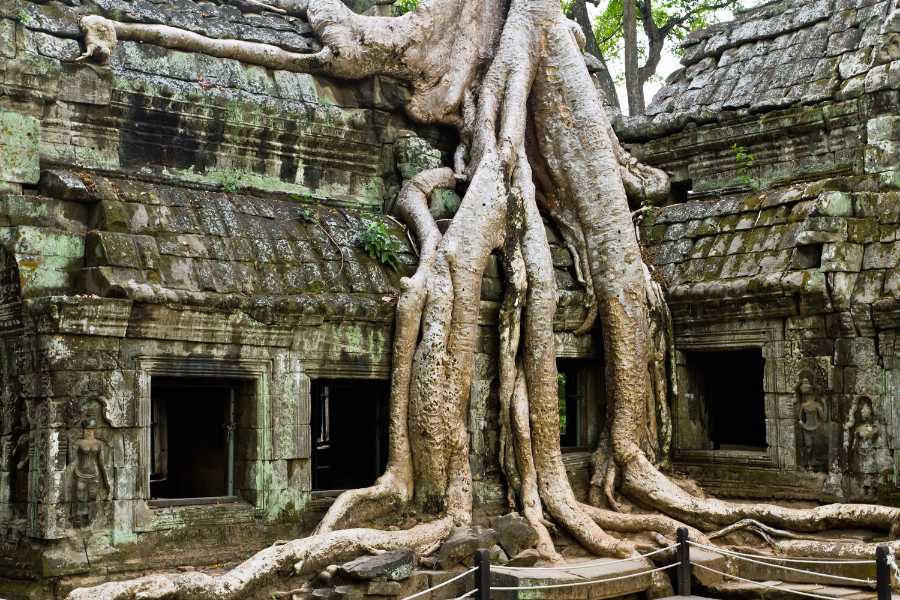
A Brief History of Ta Prohm – Built by the Khmer Empire
Built in the late 12th century by King Jayavarman VII, Ta Prohm, originally Rajavihara ("Royal Monastery"), served as a Buddhist monastery and university. Over time, the jungle reclaimed it, creating the breathtaking sight we see today.
Ta Prohm’s Role in Popular Culture (Tomb Raider & More)
Featured in the 2001 "Lara Croft: Tomb Raider" film, Ta Prohm's otherworldly beauty gained worldwide recognition, often being called the "Tomb Raider Temple." Its unique atmosphere continues to inspire artists and travelers alike.
Unique Features of Ta Prohm – Nature Meets Architecture
The Mesmerizing Giant Tree Roots Taking Over the Temple
One of the most unforgettable sights at Ta Prohm is the massive tree roots that weave in and out of the temple’s stone walls. These towering trees, mostly silk-cotton and strangler figs, seem to grow straight out of the ruins. Their roots wrap around doorways, stretch across courtyards, and climb walls, almost as if they’ve been guarding this ancient place for centuries. It’s a surreal and awe-inspiring scene that feels straight out of a fantasy movie.
.jpg)
Mysterious Carvings and Ancient Ruins
Beyond the trees, Ta Prohm’s walls are covered in intricate carvings that tell stories of its past. From beautiful apsaras (celestial dancers) to Buddhist imagery, each carving whispers tales of the Khmer Empire’s rich history. Wandering through the crumbling corridors and moss-covered stones, you can’t help but feel like you’ve stepped back in time, exploring something both fragile and timeless.
The Atmospheric and Photogenic Appeal of Ta Prohm
Ta Prohm isn’t just a historic site—it’s an experience. The interplay of sunlight filtering through the jungle canopy, the quiet hum of nature, and the ancient stones create an atmosphere that’s both peaceful and mysterious. It’s no surprise that this temple is a favorite spot for photographers and travelers alike. Whether you’re snapping a picture of the iconic tree roots or simply soaking in the atmosphere, Ta Prohm’s beauty is unforgettable.
Best Time to Visit Ta Prohm
Ideal Seasons for the Best Experience
The best time to explore Ta Prohm is during Cambodia’s dry season, from November to February. The weather is cooler and comfortable, making it easy to wander through the temple grounds while enjoying its natural beauty.
Best Time of Day to Avoid Crowds
For a more peaceful experience, try to visit early in the morning. Catching the sunrise not only gives you softer, magical light for photography but also means fewer people around, letting you absorb the temple's serene atmosphere.
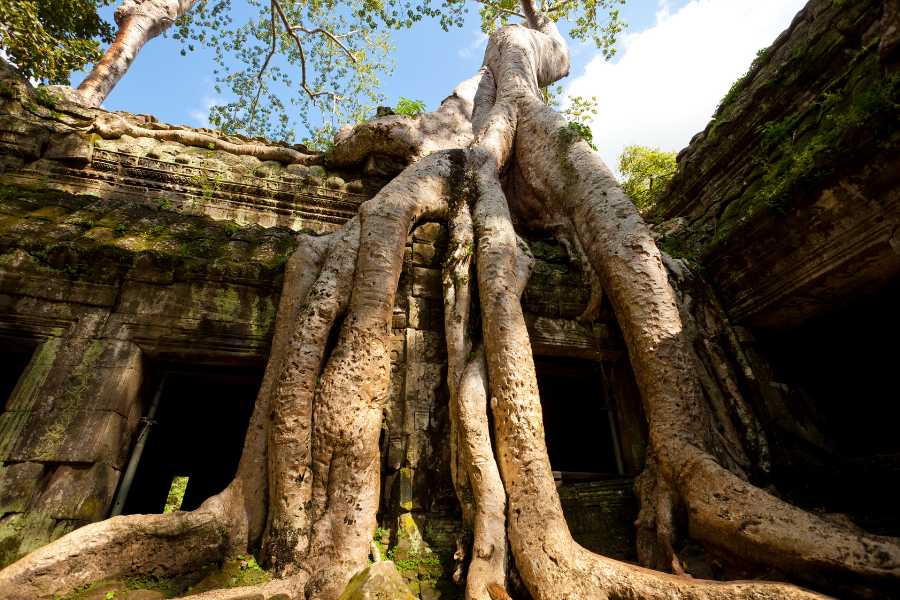
Weather Considerations & Travel Tips
If you’re planning a visit during the rainy season (May to October), be prepared for occasional showers. A light raincoat, comfortable shoes, and a bottle of water are all must-haves. Regardless of the season, don’t forget your sunscreen and a hat for extra protection if it’s a sunny day. Enjoy your visit and take your time to soak in the unique blend of history and nature!
How to Get to Ta Prohm
Location Within the Angkor Archaeological Park
Ta Prohm is located in the eastern part of the Angkor Archaeological Park, relatively close to Angkor Thom (Bayon Temple) and Banteay Kdei. It's part of what's known as the "small circuit" temple route.
Transportation Options – Tuk-Tuks, Bicycles, and Tours
The most common way to get around the Angkor complex is by tuk-tuk (a kind of motorized rickshaw). You can easily hire a tuk-tuk driver for the day who will take you to various temples, including Ta Prohm. Alternatively, if you're feeling adventurous and the weather is cooperative, you can rent a bicycle and explore at your own pace. Many guided tours also include Ta Prohm as part of their itinerary, often combined with Angkor Wat and Bayon Temple. For travelers seeking a wider cultural journey, several operators also offer Vietnam Cambodia tours that seamlessly cover both countries’ highlights.
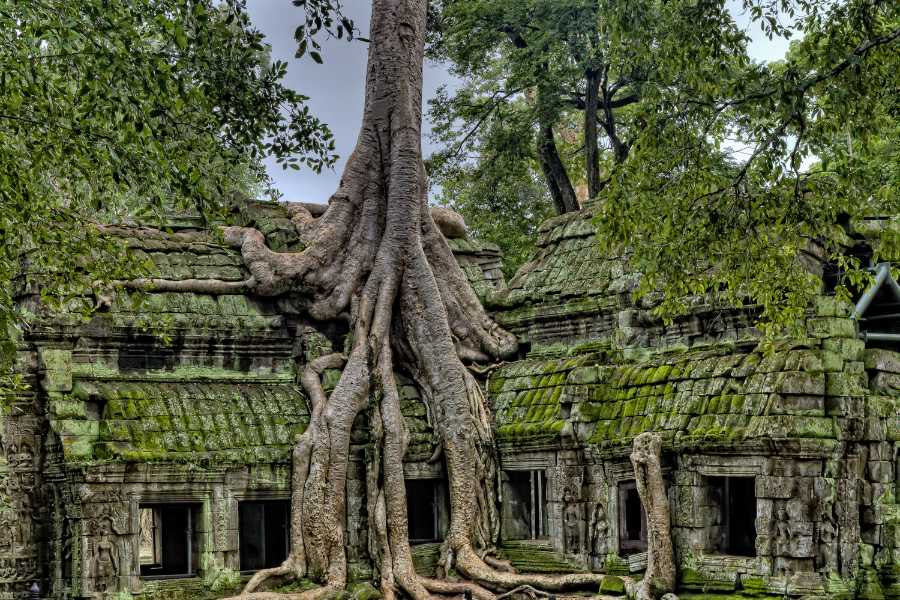
Entrance Fees and Ticket Information
You'll need an Angkor Pass to enter Ta Prohm and other temples within the Angkor Archaeological Park. These passes are available for one day, three days, or seven days, and can be purchased at the official ticket center. Make sure to keep your pass with you, as you'll need to show it at each temple entrance. It's a good idea to check the latest ticket prices and regulations before your visit, as they can change.
Things to Do at Ta Prohm
Explore the Temple’s Hidden Passageways
Step through ancient doorways and wander down narrow corridors where time seems to stand still. Many of Ta Prohm’s passageways are partially collapsed or covered in moss, adding to its lost-in-time charm. Keep an eye out for intricate carvings and hidden nooks that whisper stories of the temple’s past.
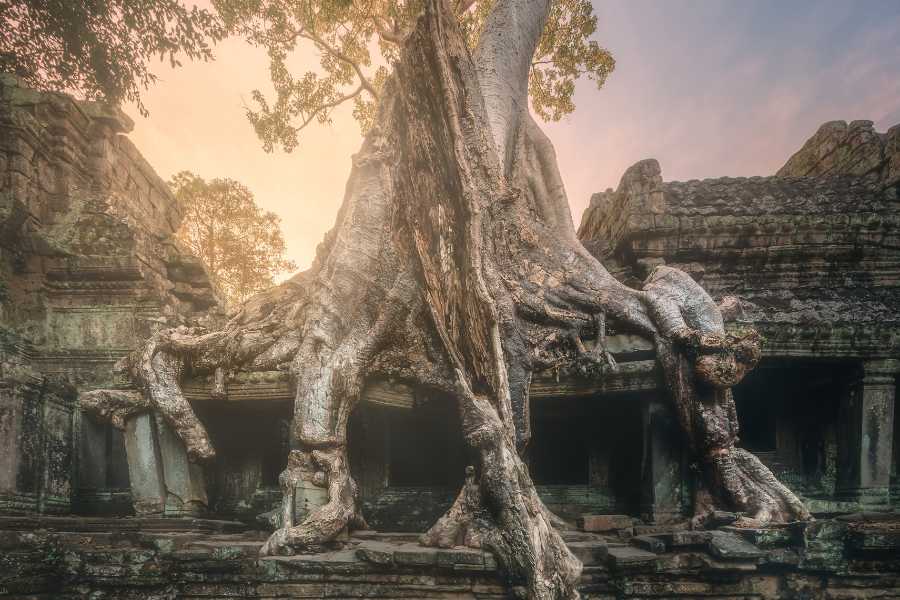
Capture Stunning Photos of Tree-Covered Ruins
Whether you're a professional photographer or just snapping pictures on your phone, Ta Prohm is a dream location. The way the towering trees wrap around the stone walls makes for breathtaking shots. Visit early in the morning for soft lighting and fewer crowds, or after a light rain when the moss glows a vibrant green.
Discover the Nearby Temples and Attractions
Ta Prohm is part of the Angkor Archaeological Park, meaning there’s plenty more to see nearby. Just a short tuk-tuk ride away, you can explore Angkor Wat, the world’s largest religious monument, or Bayon Temple, famous for its giant stone faces. If you have time, check out Banteay Kdei, a quieter temple with similar tree-covered ruins.
Tips for Visiting Ta Prohm
What to Wear and Bring
Dress respectfully and comfortably - light, breathable clothes that cover your shoulders and knees work best. Wear sturdy walking shoes as the ground can be uneven. Don't forget a hat, sunscreen, mosquito repellent, and plenty of water. A small flashlight can be handy for darker passageways, and bring a rain jacket during wet season.
Respecting the Sacred Site – Dos and Don’ts
Please don't climb on the ruins or touch the carvings - they're fragile and need protection. Stay on marked paths to help preserve the site. Taking photos is fine, but be mindful of other visitors and any areas marked as restricted. Remember, Ta Prohm is still a sacred place for many locals, so keep your voice down and be respectful.
Hiring a Local Guide for a Deeper Experience
A local guide can really bring Ta Prohm to life with stories about its history and hidden details you might miss on your own. They know the best spots for photos, and quieter paths to explore, and can help you avoid the busiest times. Most guides speak good English and can be hired at the main entrance or arranged through your hotel. If you prefer a more exclusive experience, private Cambodia tours can be arranged, allowing you to explore Ta Prohm and nearby temples at your own pace.
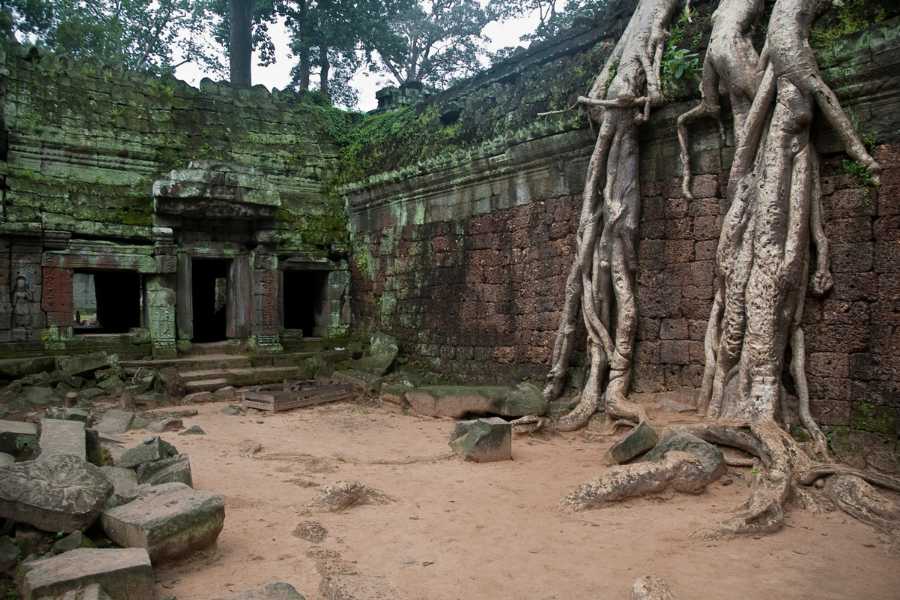
Conclusion – Why Ta Prohm is a Must-See in Cambodia
The Magic of Ta Prohm and Its Timeless Appeal
The captivating embrace of nature, the intricate carvings whispering stories of a bygone era, and the mystical atmosphere all contribute to Ta Prohm's unforgettable charm. This iconic temple stands among the Best Places in Cambodia to experience history, culture, and nature in perfect harmony. It's a place that sparks the imagination and leaves a lasting impression. This temple isn't just a historical site; it's a living, breathing testament to the passage of time and the enduring power of nature.
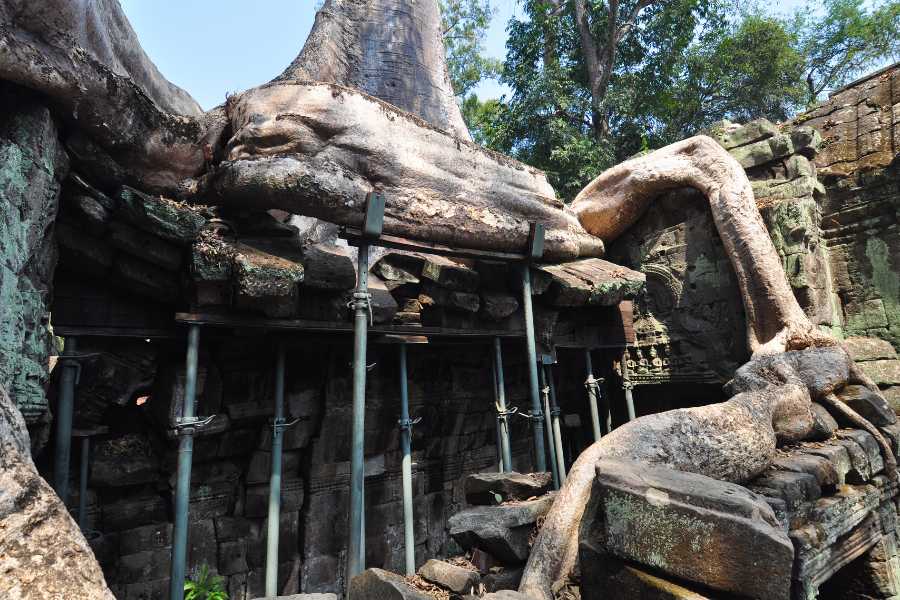
Final Travel Tips for an Unforgettable Visit
Remember to arrive early to beat the crowds and soak in the serene morning atmosphere. Wear comfortable shoes, pack water, and be prepared for both sun and rain. And if you're looking for a seamless and enriching travel experience in Cambodia, including a visit to Ta Prohm, check out the curated tours and travel services offered by Threeland Travel. We can help you plan your perfect Cambodian adventure!
















